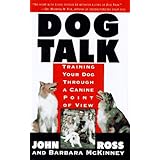
Average Reviews:

(More customer reviews)John Ross is vastly under-rated and under-cited; at least it seems that way with other trainers I've spoken with on the East Coast of the USA. This book provided the foundation for my training with my first dog that has led to my entry into professional dog training. While many people looking for house manners for their puppies seem to turn to the Monks of New Skete book, a fine work in its own rite, those who I encounter who chose *Dog Talk* typically seem to have better working relationships with their dogs.
Perhaps it is his clear, concise, and straightforward method that makes the difference. Not only does he talk about his successes in dog training, he offers examples of his own failures in dog training to clearly demonstate to the reader better methods that he acquired as a result. Personally, I like to learn from someone who is likewise interested in learning, as well--I tend to be wary of those who seem to have never made mistakes.
Not only does he get a dog owner through the basics of house manners, he includes solid instructions for expanding into a working relationship with a canine, and that includes a few fun tricks.
This book is divided into two sections--the white section includes general stories, and anecdotally describes how to speak to your dog on a level he understands. In the central grey section he tells, step-by-step, how to train a particular behaviour (e.g., "Sit," "Stay," etc.), what to expect as your dog begins to learn, and how to address specific problems as they arise in the training process. He doesn't expect one to read his mind when he describes a process--he gives one all the necessary information, including photographs, so one will know if one is going about something the right way.
The only potential drawback to this book is that he does incorporate a traditional dog training collar in some exercises. I contend, however, that if one has firmly followed his instructions on how to engage a dog--in language the dog understands--one will find that the dog performs such that corrections are not necessary. This is especially true if you begin work with a puppy (a dog under the age of two).
If all humans engaged their new pups in *Dog Talk* from the day they brought them home, the dog shelters/dog pounds would no longer be over-flowing with discarded pets, and there would be virtually no such thing as a "bad" dog anymore.
This book really is just that good.
Click Here to see more reviews about: Dog Talk: Training Your Dog Through A Canine Point Of View
Click here for more information about Dog Talk: Training Your Dog Through A Canine Point Of View

No comments:
Post a Comment